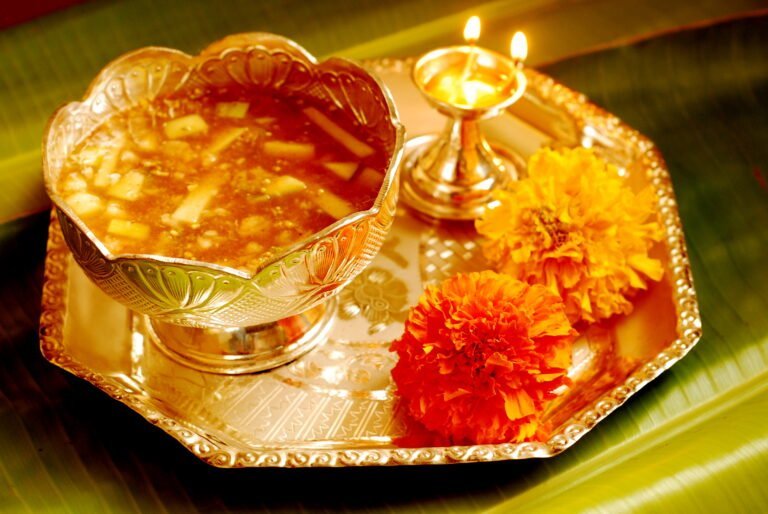Contents
ToggleIn short
Ugadi or Yugadi, also known as Samvatsarādi (lit. 'Beginning of the Year'), is New Year's Day according to the Hindu calendar. It is celebrated festively in these regions on the first day of the Hindu lunisolar calendar month of Chaitra. This usually falls in the month of April of the Gregorian calendar.

Ugadi, the Hindu New Year
The day is observed by drawing colourful patterns on the ground called Muggulu, mango leaf decorations on doors called torana, buying and giving gifts such as new clothes, giving charity to the poor, oil massages followed by special baths, preparing and sharing special food called pachadi and visiting Hindu temples.
Pachadi is a remarkable festive food that combines all the flavours – sweet, sour, salty, bitter, astringent and pungent. In Telugu and Kannada Hindu traditions, it is a symbolic reminder to expect all the flavours of experiences in the coming new year and make the most of them.
Followers of the Souramana calendar system observe Ugadi in Karnataka, when the sun transits the constellation Aries, which is also the festival of Baisakhi, and is locally known as Souramana Ugadi or Mesha Sankranti.
Preparations for the festival begin a week in advance. Houses are thoroughly cleaned. People buy new clothes, including dhoti, and buy new items for the festival, decorate the entrance of their houses with fresh mango leaves. Mango leaves and coconuts are considered auspicious in Hindu tradition and are used on Ugadi. People also clean the front of their houses with water and cow dung paste and then draw colorful floral designs. People offer prayers in temples. The celebration of Ugadi is marked by religious zeal and social gaiety.
The festive dish pacchadi symbolically reminds people that the coming year – like all of life – will consist not only of sweet experiences, but of a combination of sweet, sour, salty and bitter episodes. Just as different substances are linked together, one is reminded that no event or episode is entirely good or bad. Even in the midst of bitter experiences, there are sweet moments. One is also reminded that the experience of taste is transient and ephemeral; so is life, and one must learn to put pain and pleasure in an appropriate temporal perspective.
Special dishes are prepared for the occasion. In Karnataka, foods such as Holige, Obattu and mango pickles are made. In Andhra Pradesh, foods such as pulihora, bobbatlu, New Year Burelu and Pachadi, as well as preparations made with raw mango, are well suited for the occasion. Among these, pachadi is the most notable and consists of a chutney-like dish that combines ingredients to give the six flavours of food (షడ్రుచులు – ṣaḍruculu): sweet (తీపి – tīpi), sour (పులుపు – pulupu), salty (ుపు – pulupu). – uppu), spicy (కారం – kāraṁ), bitter (చేదు – cēdu) and astringent (వగరు – vagaru).
This festive Hindu food is made of tamarind paste (sour), neem flowers (bitter), brown sugar or sweet jaggery (sweet), table salt (salt), green chilli (spicy) and raw mango (astringent). It is a symbolic reminder of the complex phases of life that one should reasonably expect in the new year.
Social networks
Today, the people of Dekkan (South India) celebrate the new year, Ugadi. After a major ritual cleansing of the house and body, this celebration is accompanied by large traditional family meals. #mythology #myth #legend #deccan #dekkan #ugadi
Picture
